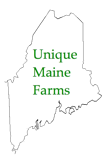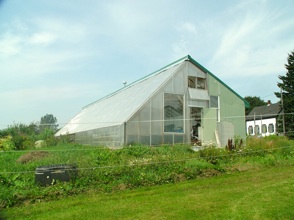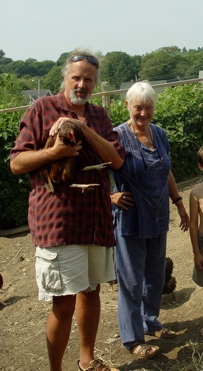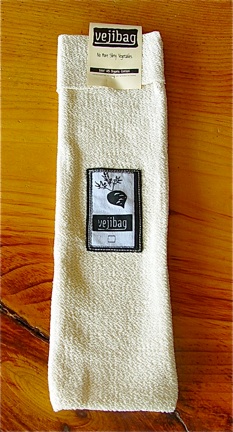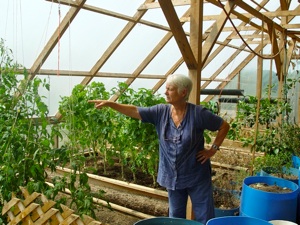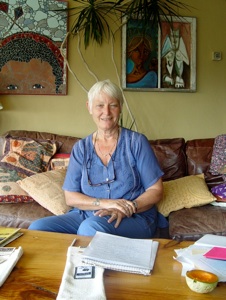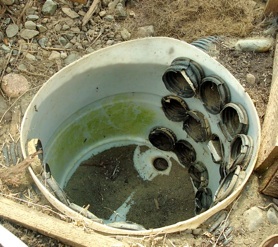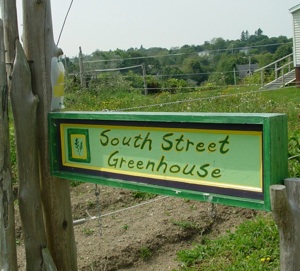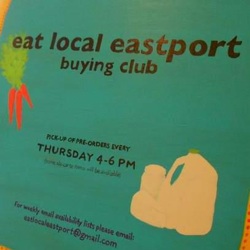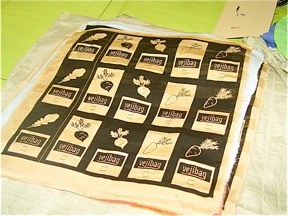Name: South Street Collective
Contact: Sally Erickson
Timothy Bennett
3 South Street
Eastport, Maine 04631
Phone: 207-853-2087
Facebook:
facebook.com/southstreetgreenhouseandgarden
Vejibag Website: www.vejibag.com
Email: sallye@blast.com
Products and Services:
-year-round vegetables
-Vejibags and VejiBIGs
-workshops and talks
-fresh eggs
-solar greenhouse
-cottage industry offering local employment
What Makes South Street Collective Unique?
South Street is a quiet residential street located in the beautiful coastal town of Eastport. A large 24’ x 72’ solar greenhouse that offers year-round vegetables is situated on South Street. A vibrant Vejibag cottage industry that offers employment to several area residents can also be found there. Thanks to the pioneering spirit and the creative efforts of Sally Erickson and Timothy Bennett, many exciting happenings are occurring on South Street. Their greenhouse project and their Vejibag enterprise are enhancing the local food movement and proving to be a real asset to the community.
Sally Erickson is a retired psychotherapist and Tim Bennett is a writer. Previous to establishing their greenhouse and the Vejibag business, they worked on What a Way To Go: Life at the End of Empire. It was a 2007 documentary film that explored various critical environmental issues such as climate change, extinction, oil consumption, and the effects of global warming. Their interest in the saving of energy, the sustainable food movement, and socially-responsible business practices obviously transferred to the career choices that they made when they moved to Eastport.
Sally and Tim had attended a workshop on the Greenhouse Project that was hosted by the Washington County Food and Fuel Alliance. It had been conducted by Tony Ferrara and Tom Adamo, the founders and designers of the Greenhouse Project. Sally and Tim also did extensive research and decided to model some of the features of their greenhouse on a successful solar-heated greenhouse operation in Colorado. A great deal of their time and effort were dedicated into designing and building the structure.
The South Street Greenhouse measures 24‘x72’ and is quite innovative in design. Sally and Tim were able to purchase large polycarbonate panels for the greenhouse at a reduced price through the Greenhouse Project. The back north wall of the greenhouse is heavily insulated. The heat that is produced in the greenhouse is blown downwards by two eighteen-inch fans and stored in three layers of 2600 lineal feet of four-inch black plastic drain pipe that is buried in several feet of sand and gravel.
The design of the building has proven to be highly effective. Vegetables are able to be grown year-round at the South Street Greenhouse. Sally explained that during the past winter the temperature only dropped below freezing on three occasions and the hardy cold-weather plants that they were raising were not adversely affected. Heron Weston is the present Greenhouse Manager. The vegetables from the South Street Greenhouse have been sold to the Buying Clubs in Eastport, Machias, and Calais.
The year-round vegetables that Sally and Tim were growing attracted quite a following. Customers were interested in ways to keep their greens fresher. From an environmental perspective, storing the greens in a plastic bag was not acceptable. Lettuce stored in plastic tends to quickly become limp and slimy. If produce that is purchased does not stay fresh and crisp, it often ends up being wasted.
During a brainstorming session to address the challenges associated with keeping greens and vegetables fresh and crisp, the idea of the Vejibag was born. The Vejibag is crafted from one hundred percent cotton fabric and string that is made from cotton that is grown and milled in the United States. It measures 9”x12” and is sold separately and in three-packs. The cotton that is not dyed that is used in making the Vejibag helps to absorb excess moisture and allow air flow. Sally and Tim cleverly described the Vejibag as the “Volvo of vegetable storage.” A larger version of the Vejibag is now on the market and it is 9”x17” and is aptly called a VejiBIG.
Vejibags and VejiBIGs can be ordered online through the Vejibag website. They can also be ordered through Eat Local Eastport. Bags can be purchased at the R&M IGA in Eastport and at The Good Table in Belfast. They are also sold at Twig in Chapel Hill, North Carolina, and at Vespertine in Carrboro, North Carolina.
In the beginning stages of the Vejibag project,
Sally and Tim were renting shop space and paying for the screen printing and marketing of the Vejibags. To establish a more economically-feasible operation they moved the business into their home and decided to do their own silkscreening and marketing work through their website and Facebook page. They have built up their retail and wholesale market.
From the start of the project, Sally envisioned a cottage industry type of set-up. She wanted to pay individuals who were interested in working from their home to sew the bags. Over a dozen women who lived in the local area were eager to do the sewing work. In an area where jobs are difficult to acquire, the flexibility that making Vejibags offers is greatly appreciated. The artisans can work at their own pace at their own home. They are compensated for each bag that they create.
Although Sally and Tim have resided in Eastport for a relatively short time, their interest in the local food movement and their creation of jobs for area residents have been very well-received. On the day that Unique Maine Farms visited their greenhouse this past August, Sally had delivered a presentation at the Eastport Library about the connections between local food and personal and environmental health.
A commitment to being environmentally conscientious underlies all the operations taking place at the South Street Greenhouse and in the work of the South Street Collective. All the materials that are utilized are able to be composted. The ink is water-soluble and the paper is one hundred percent recycled. Sally commented that they were “just about as green as it gets.”
The willingness of Sally to share information on the Vejibag website about the best ways to keep
vegetables fresh is admirable. The four factors
that need to be addressed in doing this are removing microbes; maintaining humidity; encouraging air flow; and maintaining cold temperatures. General directions are provided on the website for most vegetables and information that is specific to eggplant, peppers, sweet corn, tomatoes, avocados, and root and storage vegetables is also shared.
Many excellent reviews and testimonials that praise the value of the Vejibag are shared on the website. Sally and Tim have made a conscious effort to reach out to others. Helpful tips are shared on their website and on their Facebook page. They acted on their interest in growing healthy food on a year-round basis in an energy-saving way by fully exploring various options and creating their own unique design of a solar-heated greenhouse. The establishment of their Vejibag cottage industry promotes the local food movement and the concept of eliminating food waste. The Vejibag operation also serves as an excellent model of how alternative employment opportunities can be created in a rural area. South Street may be a quiet little street in a charming quiet little town, but the word is getting out about some of the real noteworthy happenings that are taking place there because of the efforts of Sally Erickson and Timothy Bennett.


